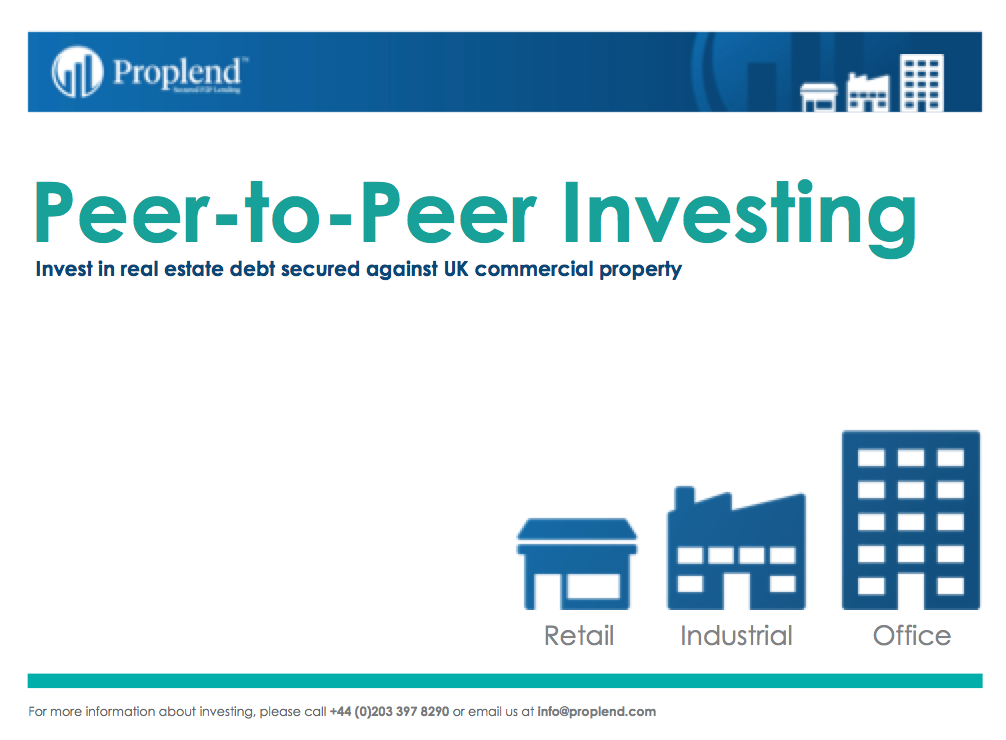
Having defaulted our first loan earlier this month (notifying all participating Lenders), we thought it would be an appropriate time to remind all Lenders of the potential risks of payment delay and capital loss when investing in peer to peer loans.
Proplend specialises in facilitating mortgages on income producing commercial real estate and commercial bridge loans on non-income producing commercial property. While the underlying assets and risk-adjusted returns offered may vary, every loan funded on our platform has two critical success factors – regular monthly interest payments and full capital repayment at the end of the loan term.
All peer to peer investors should be aware that loan investments aren’t covered by the Financial Services Compensation Scheme (FSCS), and that their capital is therefore at risk. But where servicing issues during the loan term or at time of redemption, impact a loan that they’re participating in, Lenders are at an increased risk of experiencing capital losses and not receiving the full advertised return.
Below, we take a closer look at Regular Interest and Capital Repayment risks and underlying causes of p2p property loan failure, as well as outlining the safeguards and options at Proplend’s disposal to help secure the best outcome for all Lenders.
Regular Interest
Risk – The borrower stops making interest payments when they fall due.
Potential causes:
- The Borrower’s tenant falls behind with their rent
- The Borrower fails to re-let vacant space as per their business plan expectation
- The Borrower mismanages rental income (full rental income is being received by them, but they don’t use it to pay the interest on the loan)
Proplend next steps
If a Borrower does miss an interest payment when it falls due, interest is paid to Lenders via the Interest Reserve facility that Proplend takes as part of the security package on all loans it facilitates. Interest is automatically paid to participating accounts from the Reserve on the regular payment date, and Proplend immediately engages directly with the Borrower.
What we are looking to understand is why this has occurred and how quickly the Borrower can make good the interest shortfall. For example, a Borrower may be looking to re-lease the property and will need the approval of Proplend Security Limited (as security Trustee), to do so. We would work with the Borrower to ensure the new lease makes sense and that the rental income is returned as close to the same level as possible – as quickly as possible (whilst being conscious of the loan’s ICR covenant).
In this example, should the Borrower be unable to re-let the property for any reason and continues to fall behind with making interest payments, then Proplend has the option to follow the enforcement protocol within the Security Documentation. Depending on the actual circumstances involved, this could result in the loan being defaulted. Any such action would not be taken lightly and would factor in multiple considerations to ensure a maximum recovery and realisation of the underlying loan security for the benefit of the Lenders.
Late payment of interest can happen, but repeated late payment is something we take very seriously. Proplend will inform Lenders as soon as a Borrower’s interest-servicing conduct becomes a concern and we are considering further action.
Capital Repayment
Risk – The borrower fails to make full loan redemption by the loan maturity date.
Potential causes:
- Sale of the property is taking longer than anticipated
- Refinance of the property is taking longer than anticipated
- Capital value of the property has fallen (due to new leases being granted at lower rental values or a tenant failure leading to lower or no rental income)
Identifying and communicating potential repayment issues in advance of maturity
We keep in regular contact with Borrowers throughout the term of the loan, with formal reviews annually (if applicable), and then six and three months prior to loan maturity. At each loan review we try to ascertain the progress being made towards the business plan. That is, where the funds for repayment will be coming from and when. Where possible we seek assurances for repayment in the form of at least one of the following:
- An offer letter for refinance from the financing party
- Direct contact with the Borrower’s solicitors
- Sight of the property being marketed
- Confirmation of an exchange pending completion
The confirmation we are looking for may often be provided to us on a strictly Private and Confidential basis (which we’ll need to abide by), but it does enable us to update participating Lenders with our assessment of the likelihood of their being repaid in full and on time. If we have concerns, we will of course share them with Lenders as far as we’re able to do so.
Proplend next steps
Where capital is not repaid on the agreed basis at loan maturity, we will already be in constant dialogue with the Borrower. And we’ll remain in regular discussion until full repayment is achieved, or until we take our final course of action – enforcing the first legal charge over the securing property we hold on behalf of Lenders.
Whilst liaising closely with Borrowers to help them meet their obligations typically achieves the desired outcome, we will not delay in taking the appropriate enforcement action. This includes defaulting loans, in situations where we are no longer sufficiently confident of the Borrower achieving full repayment within a reasonable timeframe.
We are committed to full transparency and keeping our investors appraised of the progress of their investments. However, there may be times when we can’t divulge certain details due to their sensitivity. When dealing with sensitive and confidential information we must consider at all times, the potential detrimental impact that misuse or wider disclosure (to third parties) could have on the value of security, for example.
Final thoughts …
Our expectation at the start of every loan request we facilitate, is that the Borrower will conduct their loan in good order by maintaining monthly interest payments and redeeming the loan on time. Notwithstanding this, Lenders should fully appreciate the risk that one or both of these expected outcomes might not occur.
The Proplend platform went five years before the first loan defaulted, though it was inevitable that it would happen at some point. All platforms will experience loans that do not perform as expected, but what sets us apart is the extra diligence. Identifying (and declining) as many of the potentially problematic loans in advance through the quality of our underwriting practices, and not facilitating development finance loans.
When servicing issues do occur, we react in the most appropriate way given the circumstances, whilst always acting in our Lenders’ best interests to try to avoid and mitigate any investor losses.


